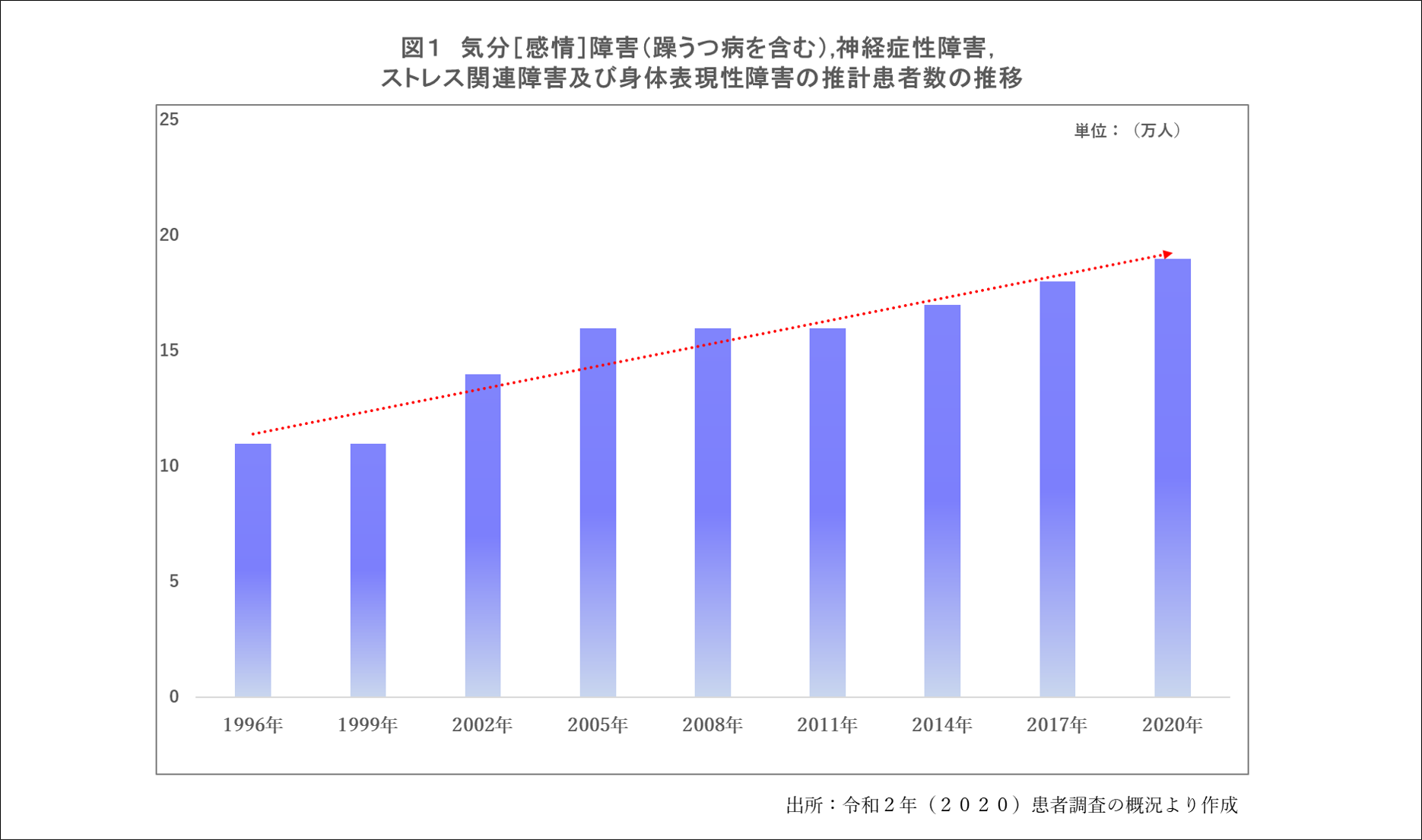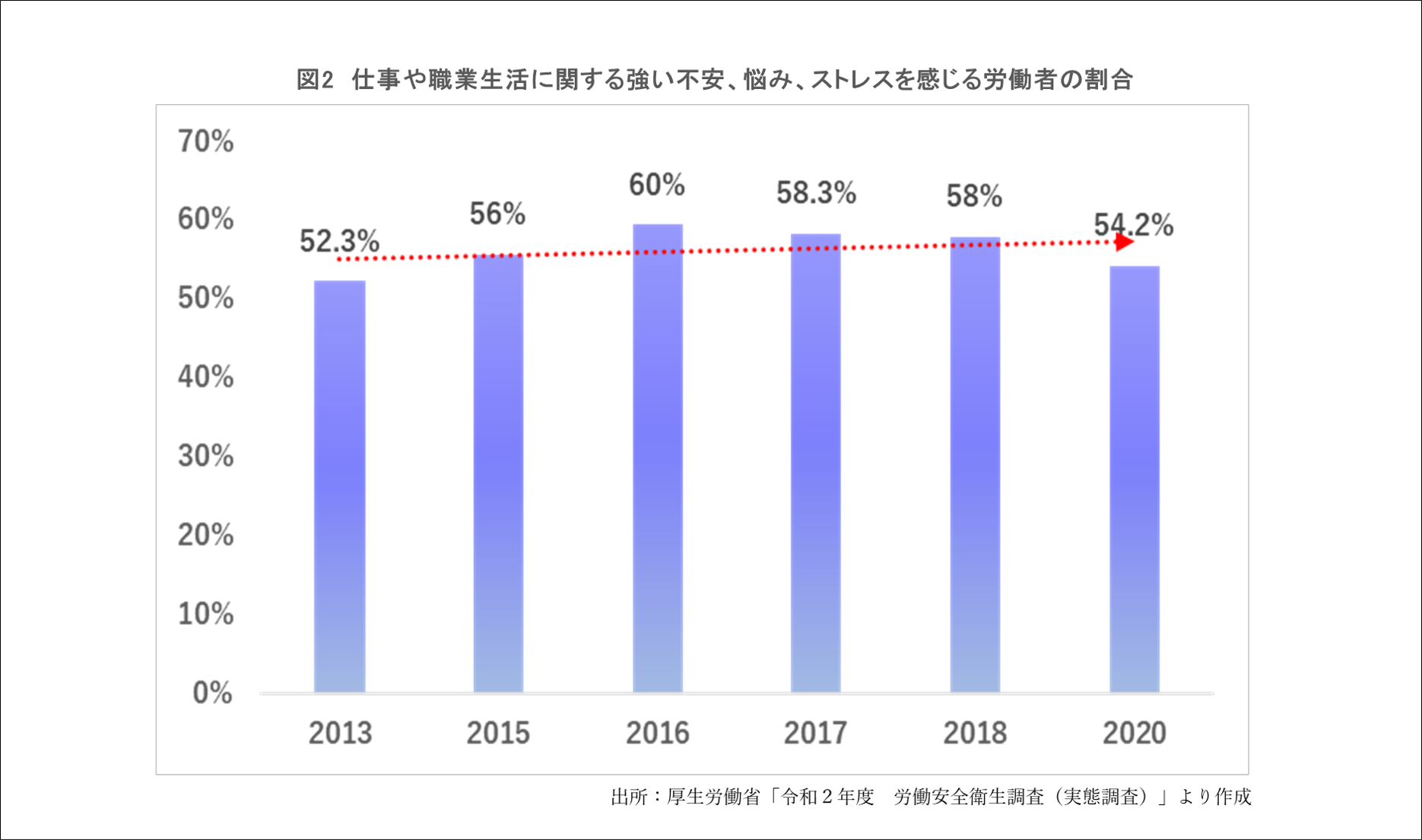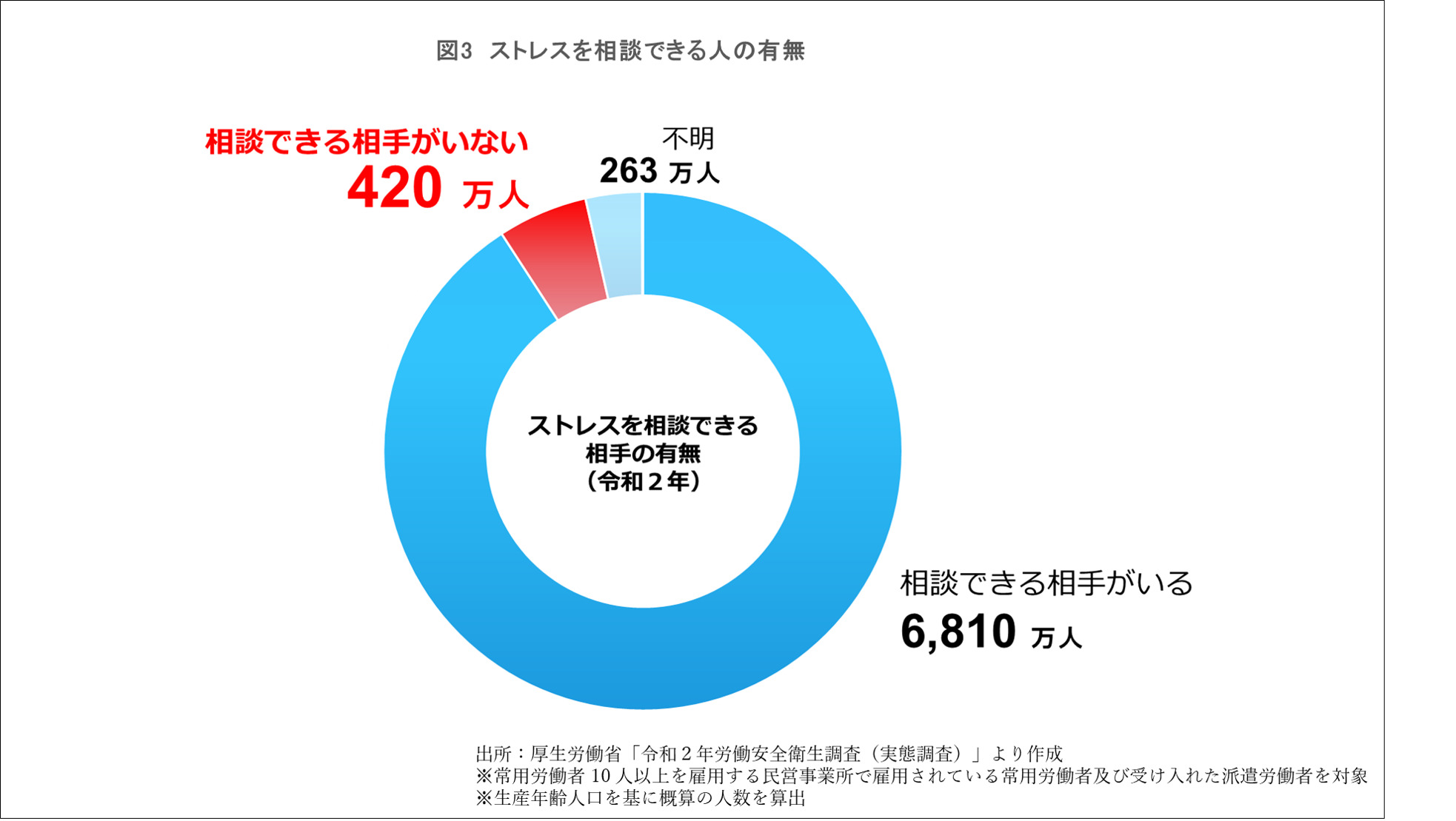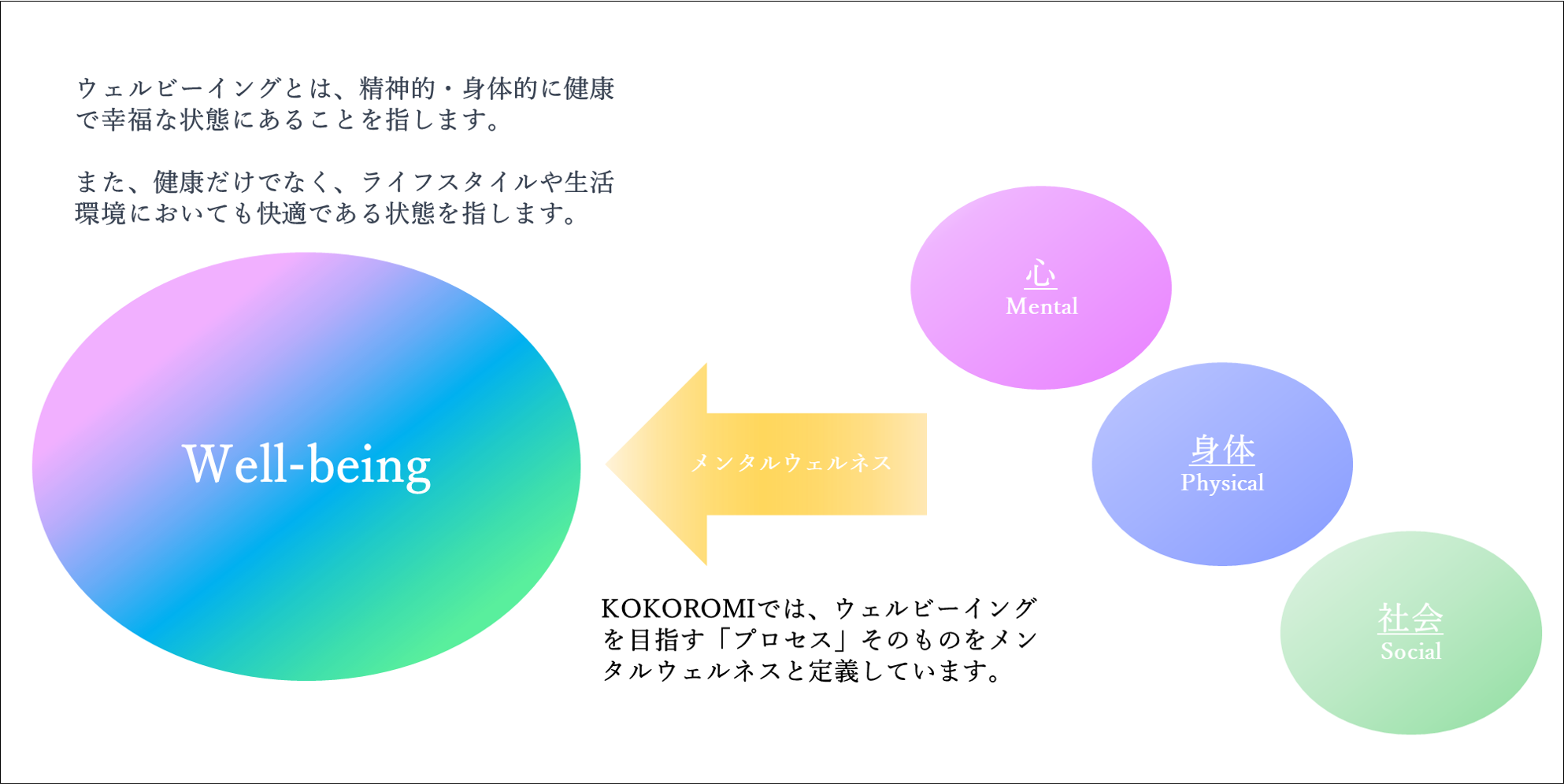
“心理的ストレス”を抱える人たちが増加している時代
2020年3月、新型コロナウイルス感染症拡大により、人々の生活は大きく変化しました。
人の交流の減少、在宅勤務の増加をはじめとした生活様式の変化、価値観の多様化。
さらには、日本経済の停滞や様々な社会問題、先行きの見えない不安や孤独感、悩みなどから心理的な問題が顕著になってきています。
不安感や心理的ストレスを抱える人が増加したことで、精神科やカウンセリングを受ける人が近年増加傾向にあります。
また、価値観の多様化により新しいライフスタイルを求める人々が増えています。
図1より、仕事や生活などにおいて、このような先行きの見えない将来への不安や、自分の生き方に疑問視すること、不安感などにより、心理的なストレス(メンタルに不調)を抱える人が近年増加傾向であることが見て取れます。

仕事や職業生活において、強い不安やストレスなどを抱える労働者の割合が50%以上
図2より、 2013年から2020年まで、仕事や職業生活に関することで強い不安、悩み、ストレスを感じている労働者の割合は、依然として半数の50%を超えています。
その内容を見てみると以下の順位となっています。
1位 仕事の量
2位 失敗・責任の発生
3位 対人関係

心理的ストレスを抱えやすい人の特徴
心理的なストレスを抱えやすい人の代表的な性格や特徴は、以下のようなものが挙げられます。
①神経質である
細かいことに気がつきやすく、不安感を感じやすい傾向があります。
②完璧主義者である
自分に対して高い基準を持ち、完璧を求めるため、失敗やミスに対してストレスを感じやすくなります。
③自己否定的な思考を持っている
自分に対して否定的な思考や、マイナスイメージを持っているためストレスになりやすい場合があります。
心理的なストレスを抱えやすい職業や職種は以下のようになります。
企業内の組織:人事・管理職:経営者、管理職など
医療関係職種:医師、看護師、介護士など
教育関係職種:教師、保育士、校長など
営業職種:営業担当、セールス、マーケティングなど
サービス業:飲食店、接客業、ホテル業など
心理的ストレスが及ぼす日常や仕事での悪影響
心理的なストレスが長期間にわたって続くと、身体的な症状や心理的な症状を引き起こす可能性があります。以下に、一般的なストレスが仕事や生活に及ぼす主な悪影響をいくつか挙げてみます。
1. 身体的な症状
高血圧、免疫機能の低下、頭痛や肩こり、不眠症、胃腸の不調など
2. 心理的な症状
ストレスは、気分の落ち込み、うつ病、不安、パニックなど
3. 人間関係の悪化
パートナーや家族、職場での人間関係の悪化など
4. 仕事のパフォーマンスの低下
取り組む意欲や集中力・思考力が低下、業務の遂行性や生産性の悪化など

ストレスを相談できない人が増加傾向
図3のストレスを相談できる相手の有無のグラフより、仕事に関するストレスを相談できる相手がいない人が、約420万人いることが考えられます。
これには、相談できる相手はいるけれども、その相談したい内容が相手には相談できないような悩みを抱えているケースも考えられます。
さらには、近年の情報化社会、価値観の多様化など様々な要因により、各々で、人に相談ができないような悩みや不安を抱え込んでいる人が、増加傾向であると患者数の増加からも考えられます。

ウェルビーイングの重要性の高まり
近年、世界・日本においても、メンタルヘルスに対する意識が高まっており、メンタルウェルネスやウェルビーイングに関する意識が拡大傾向にあります。
特に、新型コロナウイルスの影響によるストレスや不安感の高まりや、価値観の変化、「物質的な欲求」から「精神的な満足、そして自己実現」へと、健康面にとどまらず人生全体を豊かにする流れが、世界の潮流になりつつあります。
つまり、「モノの豊かさ」から「心の豊かさ」へ時代の変化の増加に伴い、これらのニーズが高まっています。
ウェルビーイングとは
ウェルビーイングとは、精神的・身体的に健康で幸福な状態にあることを指します。
健康だけでなく、ライフスタイルの質を向上させ、ストレスを軽減し、心身の健康を保つことが目的です。
メンタルウェルネスとは
KOKOROMIでは、ウェルビーイング(精神的、身体的、社会的に健康で幸福な状態)を目指す「プロセス」そのものをメンタルウェルネスと定義しています。
近年、ウェルビーイングの重要性が高まり、健康やフィットネス、美容、食事、リラクゼーション、精神的な健康など、多岐にわたるウェルネス産業が盛んになっています。

メンタルウェルネスを向上させるための様々な手段
メンタルウェルネスが高い状態にある人は、身体的な健康にも良い影響を与えることが知られています。
したがって、ウェルビーイングを高めるためには、メンタルウェルネスも重要な要素となります。
メンタルウェルネスを向上させ、ウェルビーイングを目指すための手段として、スポーツやフィットネス、美容、健康食品などをはじめ、ヨガ、禅、リラクゼーション、マインドフルネスといった「精神的な健康」に焦点を当てたものも注目されてきています。
近年、健康志向やライフスタイルの変化により、ウェルネス産業は急速に成長しています。
経済産業省によると、2025年には「ヘルスケア産業」としてその市場規模が、約12兆円に達すること目指しており、その重要性の高さが伺えます。
